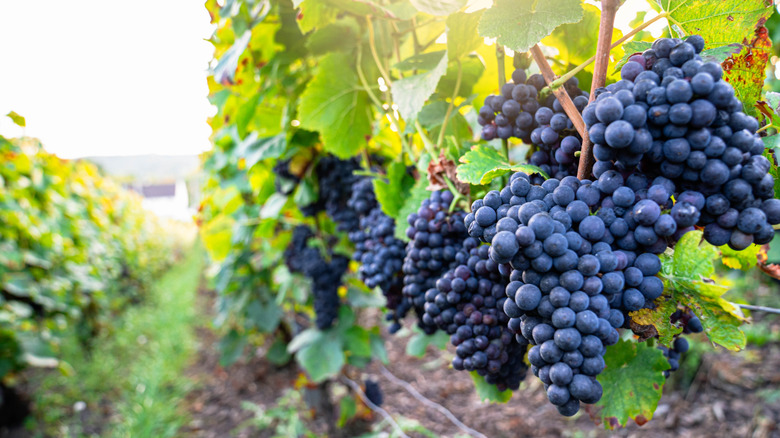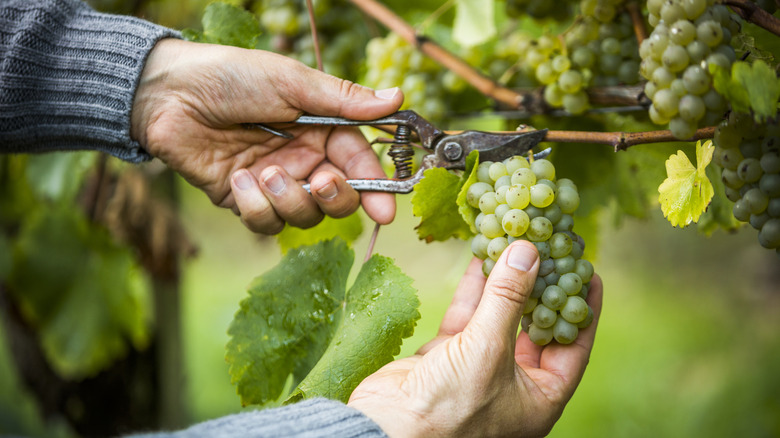Are Organic And Natural Wines The Same Thing?
Perusing the aisles of a modern, well-stocked wine store can be a daunting adventure. Among the hundreds or thousands of bottles available, it's rare that a wine label gives you much more information than the name, origin, year, and maybe a few superfluous words about tasting notes or vague dishes to pair the wine with. Although we have some great tips for how to decode a wine label, there is only so much information that you can glean from the bottle without having to pull out your phone to learn more. Some wine shops will go the extra mile and have stickers, tags, or even lengthy notes to make your selection easier, but sadly, this isn't always the case. Given the immense variety of options, it can be hard to know the differences between different types of wine production like organic, biodynamic, natural, and even vegan wines.
While they may sound similar, organic and natural wines are not the same thing. To make things more confusing, natural wine is always organic, but organic wine is not necessarily natural. While organic and natural wines aren't exactly the same, they can be thought of as extended family members, like cousins of one another. Natural wine isn't so easily defined, which is why it's so great, but organic wines have more clarified standards to adhere to, like those set by the USDA.
Organic wines adhere to more strict regulations
Unsurprisingly, organic wines are made with organically grown, harvested, and processed grapes. The grapes that are used for organic wine are farmed and grown without using any synthetic chemicals, fertilizers, or pesticides. Similar to certified organic food, the rules for what qualifies as organic wine are defined based on the country of origin's regulations, and they vary throughout the world. In the United States, this includes the exclusion of GMOs or genetic engineering as well as the requirement for the farming process to be done "in a manner that protects the environment and preserves the soil," according to the USDA. So while we can't unequivocally say that drinking organic wine is better for you, it is definitely better for the earth than conventional winemaking processes.
After harvesting, the organic grapes must also be processed without any non-organic preservatives or additives, and any other ingredients that are used in the winemaking process must be organic as well. This organic processing in the United States also forbids adding any additional sulfites, but European organic wines are allowed to use a small amount of added sulfites. Note that wine does produce some sulfites on it's own, but organic wine contains much lower levels of sulfites than wine made in other ways. If you'd like to dip your toes in the pool of organic wines, try our picks for the 17 best organic wines for Earth Day.
Natural wines are as close as possible to what nature intended
Natural wine, also known as low-intervention wine, is tinkered with by the maker as little as possible. These wines adhere to the same standards as organic wines, but the winemakers take a more hands-off approach. The name says it all, as natural wines aim to be as close as possible to the natural beginnings of the terroir and the grapes themselves. Natural wines lack a formal and legal definition, but makers of natural wine adhere to the practice of fermenting with only the yeast found on the skin of the grapes and do not filter the wine. This lack of standard filtering can give some natural wines a slightly cloudy appearance and usually leads to some sediment that settles at the bottom of the bottle, but it's perfectly harmless.
Due to the low-intervention fermentation process, natural wines tend to have a bit more funky taste, similar to that of a fermented hard cider or even kombucha. Given the delicate process of natural winemaking versus traditional methods, natural wines are usually produced in smaller batches and are a unique find that should be appreciated. If you're interested in trying a natural wine but don't know where to begin, start with these 12 natural wines that we picked out. And if you're lucky, you might just live near one of the 15 of the best natural wine bars in the US.


